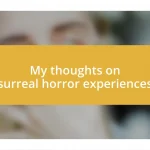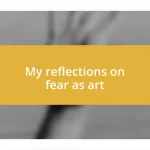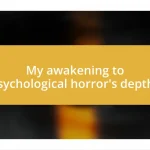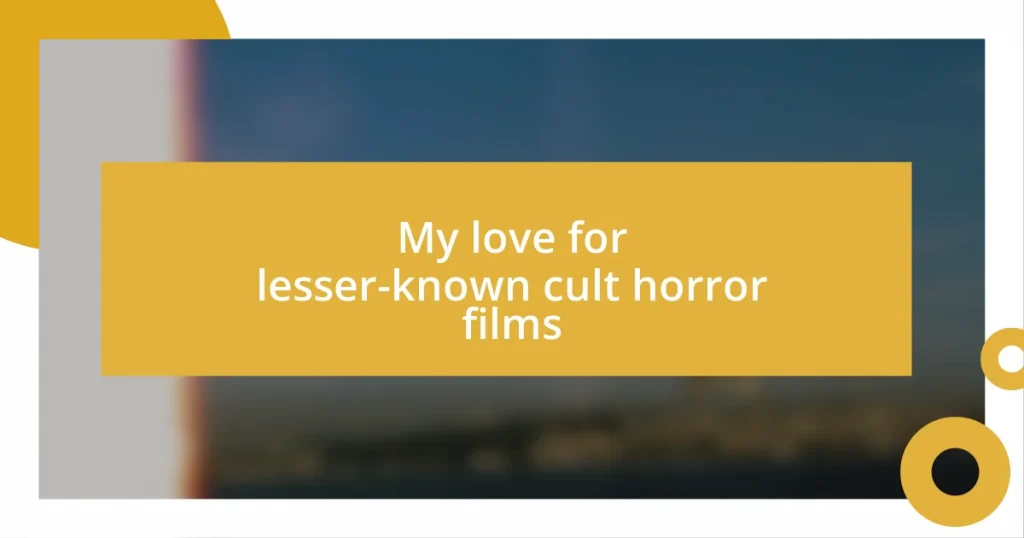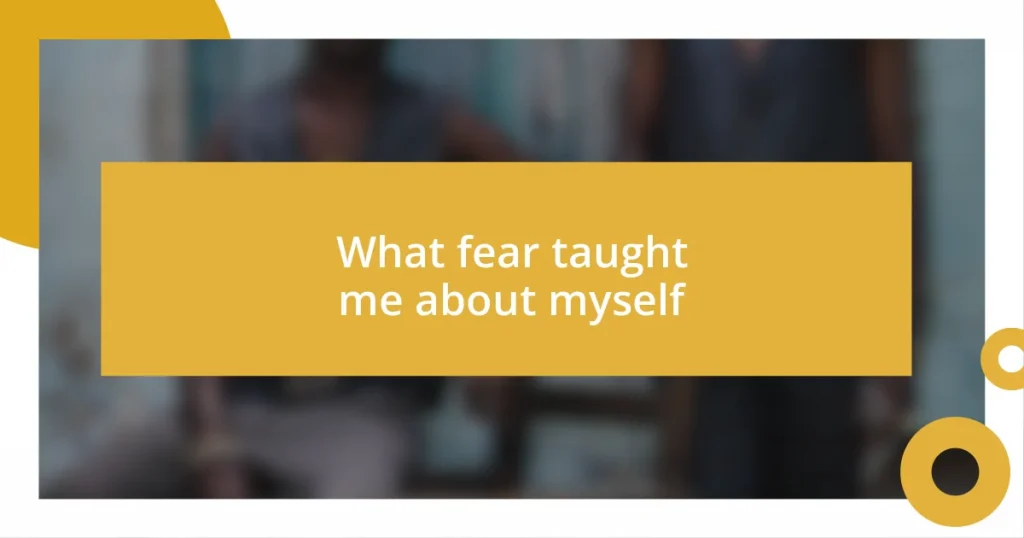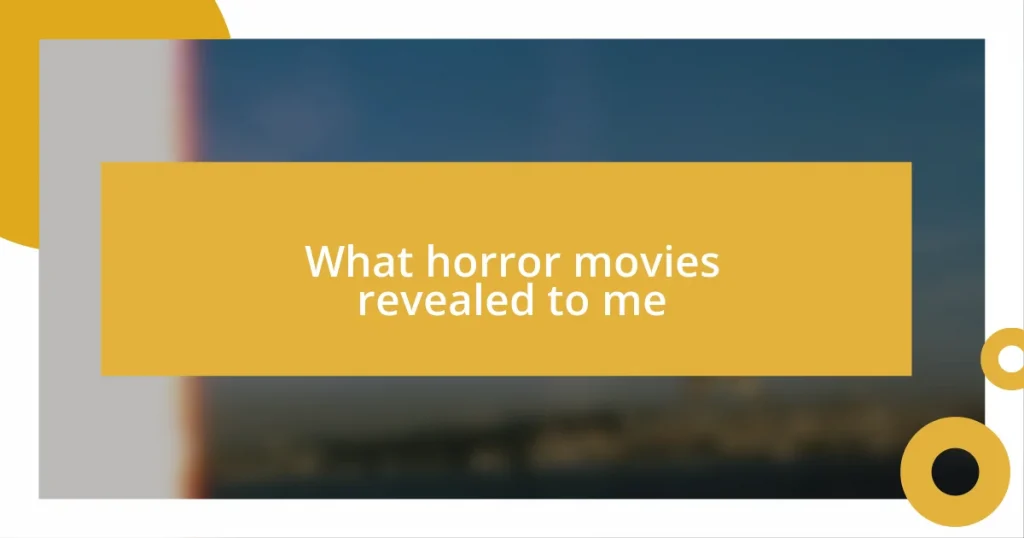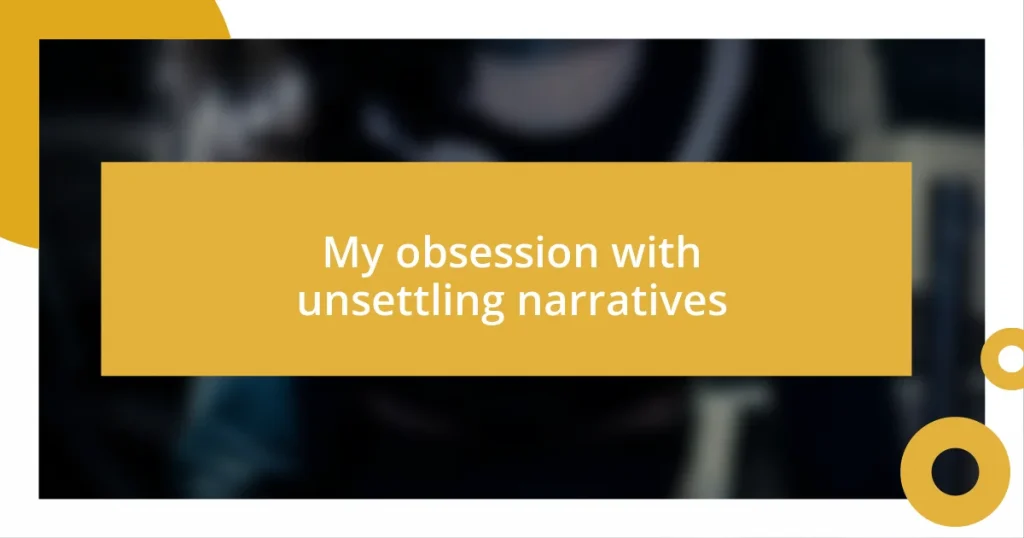Key takeaways:
- Cult horror films blend bizarre elements with strong emotional connections, fostering communal experiences among viewers.
- Key characteristics include unconventional storytelling, defiance of traditional horror tropes, and the encouragement of discussions around film themes.
- Appreciation of cult horror involves embracing eccentricity, engaging in discussions, and letting go of expectations to enjoy unexpected delights.

Understanding cult horror films
Cult horror films hold a unique place in the cinematic landscape, often blending the bizarre with the brilliant. What I find particularly fascinating is how these films cultivate a devoted following despite their unconventional narratives or production quality. Have you ever watched a movie that left you questioning reality long after the credits rolled? It’s that emotional connection that fuels cult status.
When I think of cult horror, I’m reminded of late-night gatherings with friends, huddled around a screen, ready for a wild ride into the grotesque. I once stumbled upon a film that was riddled with cheesy dialogue and ludicrous special effects, yet it became an instant favorite. Together, we laughed, cringed, and bonded over our shared bewilderment. It’s these shared experiences that elevate cult films from mere entertainment to a communal celebration of the strange.
What is it, though, that makes these films resonate on such a profound level? For me, it’s the way they challenge societal norms and provoke thought. They invite us into worlds where anything is possible, allowing for a cathartic release of fear and anxiety. I remember leaving a particularly unsettling feature thinking, “What did I just witness?” Yet, that very uncertainty drew me back for more, reaffirming my love for the lesser-known gems that continue to push boundaries.

Key characteristics of cult horror
Cult horror films often employ a unique blend of unconventional storytelling and quirkiness that sets them apart from mainstream horror. One characteristic that I appreciate is the use of extreme characters and absurd situations that evoke both laughter and fear. I recall watching a film where the protagonist battled an army of rubber chickens. Sure, it sounds ridiculous, but the sheer absurdity made it unforgettable. This bizarre charm is something I actively seek out in cult horror.
One factor that truly grabs my attention is the way these films often defy traditional horror tropes. Unlike standard jump scares or clear story arcs, cult horror revels in its unpredictability. I remember a particularly jarring film that left no resolution; the credits rolled while I was still left puzzled. It was a breath of fresh air compared to predictable endings where the hero always triumphs. This enduring ambiguity resonates with viewers, compelling them to ponder the deeper meanings or hidden messages.
Another key characteristic is the community these films foster. Watching cult horror is often about shared experiences; it’s less about being scared and more about reveling in the outrageous. I fondly recall hosting movie nights with friends, where we would gather to dissect not only the plots but also the thematic implications. There’s something uniquely empowering about watching a film that invites discussion and analysis, connecting us through the shared thrill of the unexpected.
| Characteristic | Description |
|---|---|
| Unconventional Storytelling | Uses bizarre characters and unexpected plots to evoke both fear and humor. |
| Defiance of Tropes | Rejects traditional horror formats, often leaving viewers in suspense or confusion. |
| Community Experience | Encourages discussions and connections among viewers, enhancing enjoyment. |

Notable lesser-known cult horror films
There’s a treasure trove of lesser-known cult horror films that deserve their moment in the limelight. It’s always exciting to discover a gem that not everyone has seen but leaves a lasting imprint. I remember coming across “Dead Alive” by Peter Jackson, which is often overshadowed by his later work. The sheer over-the-top gore mixed with slapstick humor turned what should have been terrifying into something utterly hilarious. It’s wild how a film can dance between horror and comedy in such an outrageous way, making it perfect for group viewings—the laughter often outweighing the screams.
Here’s a list of notable lesser-known cult horror films that I think deserve recognition:
- “The Witch Who Came from the Sea”: A haunting narrative combined with striking visuals that challenge traditional storytelling.
- “Society”: A surreal exploration of class and identity, featuring mind-bending body horror that lingers in your thoughts long after watching.
- “Troll 2”: More infamous than scary, its cringe-worthy dialogue and bizarre plot twists have earned it a dedicated fan base and a documentary, “Best Worst Movie.”
- “Phantasm”: An enigmatic tale with a dreamlike quality, this film introduces the iconic Tall Man and manages to stay in your mind for days.
- “The Burning”: Often overshadowed by more famous slashers, its production quality and memorable gore make it a classic worth revisiting.
These films often invite us to share our impressions and experiences, creating a unique bond among viewers. I still chuckle when reflecting on a time my friends and I decided to re-watch “Troll 2” after several years. We ended up quoting lines verbatim and laughing until our sides hurt. Those experiences are what cult horror is all about—discovering the outlandish together, embracing the absurdity, and creating cherished memories along the way.

Directors who define cult horror
When I think of directors who truly define cult horror, names like David Lynch and Troma’s Lloyd Kaufman come to mind. Their work embodies the essence of the genre—bold, unusual, and delightfully eccentric. I vividly remember the first time I watched Lynch’s “Eraserhead.” The unsettling imagery and haunting soundscapes lingered with me long after the credits rolled. How could a film so bizarre feel so deeply profound? It was that perfectly confusing blend of emotions that hooked me, and I realized how unique Lynch’s approach is in the pantheon of horror.
Then there’s Lloyd Kaufman, the mastermind behind the Troma Entertainment brand. Kaufman’s films, like “The Toxic Avenger,” are a riot of absurdity mixed with social commentary. When I first saw “Toxic Avenger,” I couldn’t help but laugh out loud at the over-the-top gore paired with a story about environmentalism and heroism. It made me appreciate the creative freedom these directors possess. Have you ever experienced a film that made you question the boundaries of taste and humor? That’s the magic of Kaufman’s work.
And let’s not forget about the innovative frightener, Sam Raimi, who directed the cult classic “Evil Dead.” The way he blends campy horror with genuine scares is something I admire deeply. I recall sitting in a dimly lit room with friends, watching Ash battle the undead under Raimi’s whimsical direction, and we all erupted in nervous laughter. What is it about that combination of fear and humor that makes cult horror so appealing? For me, it’s the thrill of unpredictability, where even the absurd can ignite a spark of creativity that resonates with audiences.

How to appreciate cult horror
Appreciating cult horror is about embracing the eccentricity and layers of meaning hidden within the chaos. I remember the first time I watched “Society”; it was so surreal that I spent the rest of the night pondering what it actually meant. Have you ever watched a film that left you questioning reality? It’s these unsettling explorations that draw me in, making me appreciate the artistry behind the madness.
I’ve also found that joining discussions with fellow fans deepens the experience. I recall discussing “Phantasm” with a group of friends after a late-night viewing. As we unfolded its perplexing narrative, we shared our theories about the Tall Man and his motives. Engaging with others not only enriches the film’s message but also makes watching feel like a shared adventure rather than a solitary endeavor. Isn’t it fascinating how a movie can spark such vibrant conversations?
I think it’s important to let go of expectations and enjoy the ride. When I first watched “Troll 2,” I fully prepared myself for a standard horror experience, and instead, I was bombarded with hilariously awful acting and ludicrous plot twists. It shocked me how something so misguided became a source of joy. This unexpected delight is the heart of cult horror; it’s about finding beauty—or at least amusement—in the bizarre. So, the next time you sit down for a cult horror film, ask yourself: what unconventional gems might I discover hidden beneath the surface?



